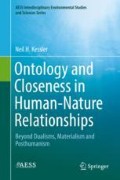Abstract
Features of relationships such as love and closeness are not post hoc conceived of in response to a primary, material experience that does not contain them inherently. Instead, these existential elements can be perceived and known directly from the relational experience. With materialism and other human/nature dualisms accounted for, the ways in which one comes to know about these kinds of relational elements expands. The methods can include American pragmatist Charles Peirce’s notion of synechism of feeling, which is the relational continuity or sharing of feeling as an existential phenomenon surrounding and subsuming relational partners. Other forms of relational knowing include the sensory-emotional notion of poetic knowledge, the idea of “personal acquaintance knowledge” as knowledge about the “other” through the lens of the relationship between Knower and Known, and propositional knowledge once it has been cleansed of human/nature dualistic elements like detachment-promoting scientific objectivity and reliability.
Access this chapter
Tax calculation will be finalised at checkout
Purchases are for personal use only
References
Anderson, D. R. (2004). Peirce’s horse: A sympathetic and semeiotic bond. In E. McKenna & A. Light (Eds.), Animal pragmatism: Rethinking human-nonhuman relationships (pp. 86–96). Bloomington, IN: Indiana University Press.
Associated Press. (2003, October 7). Grizzly mauls, kills a bear ‘expert’. Seattle Post Intelligencer.
Backster, C. (2003). Primary perception: Biocommunication with plants, living foods, and human cells. Anza, CA: White Rose Millennium Press.
Barad, K. (2007). Meeting the universe halfway: Quantum physics and the entanglement of matter and meaning. Durham, NC: Duke University Press.
Bateson, M., Desire, S., Gartside, S. E., & Wright, G. A. (2011). Agitated honeybees exhibit pessimistic cognitive biases. Current Biology, 21(12), 1070–1073.
Braidotti, R. (2006). Posthuman, all too human: Towards a new process ontology. Theory, Culture & Society, 23(7–8), 197–208.
Brown, J. H., Davidson, D. W., Munger, J. C., & Inouye, R. S. (1986). Experimental community ecology: The desert granivore system. In J. M. Diamond & T. J. Case (Eds.), Community ecology (pp. 41–61). New York: Harper and Row.
Dewey, J. (1929). Experience and nature. London: George Allen & Unwin, Ltd..
Fantl, J. (2014). Knowledge how. The Stanford Encyclopedia of Philosophy (Fall 2014 ed.). Retrieved from http://plato.stanford.edu/entries/knowledge-how
Gauch, H. G. (2003). Scientific method in practice. Cambridge, UK: Cambridge University Press.
Haraway, D. J. (2008). When species meet. Minneapolis, MN: University of Minnesota Press.
Hunter, F. (1973, December 11). Are plants ‘people’? Christian Science Monitor.
Keller, E. F. (1983). A feeling for the organism, 10th anniversary edition: The life and work of Barbara McClintock. San Francisco: W. H. Freeman and Company.
Kirk, J., & Miller, M. L. (1986). Reliability and validity in qualitative research. Newbury Park, CA: Sage Publications.
Leopold, A. (1989). A sand county almanac, and sketches here and there. New York: Oxford University Press (Original work published 1949).
Marquez, J. (2004, January 5). Was California bear advocate naturalist or ‘con man?’. Juneau Empire.
Medred, C. (2003, December 14). Man, martyr, myth. LA Times.
Noddings, N. (1984). Caring: A feminine approach to ethics & moral education. Berkeley, CA: University of California Press.
Objective. (2018, June). Oxford English dictionary online. Retrieved from http://www.oed.com
Peirce, C. S. (1960). Collected papers of Charles Sanders Peirce (C. Hartshorne, P. Weiss, & A. W. Burks, Eds.). Cambridge, MA: Harvard University Press.
Porter, T. (1995). Trust in numbers: The pursuit of objectivity in science and public life. Princeton, NJ: Princeton University Press.
Puthoff, H., & Fontes, R. G. (1975). Organic biofield sensor. Menlo Park, CA: Stanford Research Institute.
Reliability. (2018, June). Oxford English dictionary online. Retrieved from http://www.oed.com
Riefe, J. (2017, November 1). Jane Goodall on sexism, controversial feeding stations and science deniers. The Hollywood Reporter. Retrieved from https://www.hollywoodreporter.com/news/jane-goodall-sexism-controversial-feeding-stations-science-deniers-1055417
Rollin, B. E. (1990). How the animals lost their minds: Animal mentation and scientific ideology. In M. Bekoff & D. Jamieson (Eds.), Interpretation and explanation in the study of animal behavior (pp. 375–393). Boulder, CO: Westview Press.
Russell, B. (1912). Problems of philosophy. New York: Longman, Green and Company.
Stodden, V., Leisch, F., & Peng, R. D. (Eds.). (2014). Implementing reproducible research. Boca Raton, FL: CRC Press.
Taylor, A., & Giugni, M. (2012). Common worlds: Reconceptualising inclusion in early childhood communities. Contemporary Issues in Early Childhood, 13(2), 108–119.
Taylor, J. S. (1998). Poetic knowledge: The recovery of education. Albany, NY: State University of New York Press.
Warren, K. J. (1990). The power and the promise of ecological feminism. Environmental Ethics, 12(2), 125–146.
Weisberg, Z. (2009). The broken promises of monsters: Haraway, animals and the humanist legacy. Journal for Critical Animal Studies, 7(2), 22–62.
Author information
Authors and Affiliations
Rights and permissions
Copyright information
© 2019 Springer Nature Switzerland AG
About this chapter
Cite this chapter
Kessler, N.H. (2019). Relational Perception and Knowledge. In: Ontology and Closeness in Human-Nature Relationships. AESS Interdisciplinary Environmental Studies and Sciences Series. Springer, Cham. https://doi.org/10.1007/978-3-319-99274-7_7
Download citation
DOI: https://doi.org/10.1007/978-3-319-99274-7_7
Published:
Publisher Name: Springer, Cham
Print ISBN: 978-3-319-99273-0
Online ISBN: 978-3-319-99274-7
eBook Packages: Earth and Environmental ScienceEarth and Environmental Science (R0)

